| SMHRIC |
| Feb 9, 2015 |
| New York |
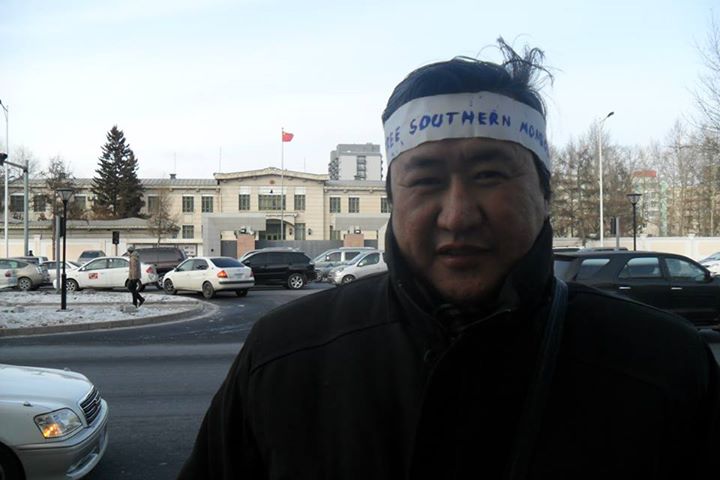 |
|
|
Mr.Munkhbayar Chuluundorj protesting in front of the Chinese Embassy
in Ulaanbaatar, Mongolia, Feb 6, 2015 (SMHRIC)
|
|
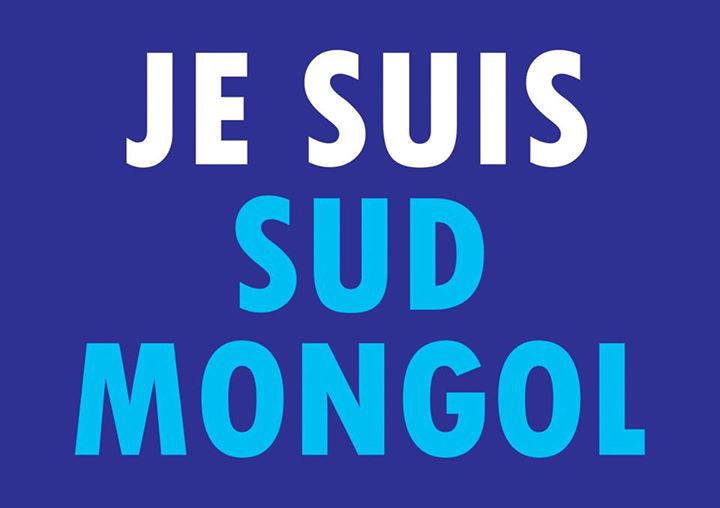 |
|
|
Slogan reading "Je Suis Sud Mongol" (I am
Southern Mongolian) used by the citizens of Mongolia in solidarity
with the Southern Mongolians (SMHRIC)
|
|
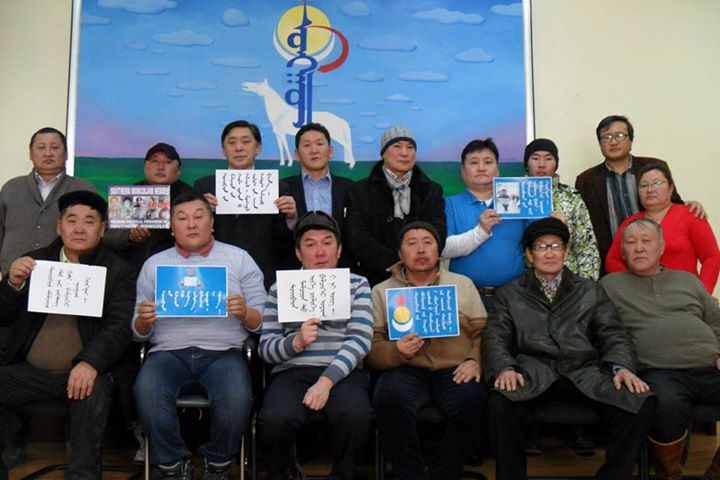 |
|
| Citizens of Mongolia support the protests of herders from Durbed Banner of Southern Mongolia (SMHRIC) |
The 8 protestors were taken to the local police station in Ulaanbaatar and detained for 3 hours. Among them, Ms. Sarnai, another activist and a strong advocate of human rights for Southern Mongolians and the organizer of the protest, was detained for 6 hours. Video footage shows the Mongolian police confiscating banners and Southern Mongolian flags during the arrest.
As the Secretary of the Mongolian Green Party, prominent journalist and human rights activist, Mr. Munkhbayar Chuluundorj has been particularly active in defending the human rights and freedoms of the Southern Mongolians. Munkhbayar has also been passionately involved in discussions and monitoring of the recent protests of Southern Mongolian herders from Durbed Banner and Sunid Right Banner against the Chinese authorities’ illegal occupation of their grazing lands. Through social media, Munkhbayar has directly been staying in touch with the Southern Mongolian herders on the ground, expressing his strong support to the protest and publicizing their plight to the citizens of Mongolia.
“The police claimed it is illegal to protest near the embassies in Ulaanbaatar,” Munkhbayar told the Southern Mongolian Human Rights Information Center (SMHRIC), “this seems to be valid only in front of the Chinese Embassy here”.
“Ms. Sarnai was detained for 6 hours, and even given a summons to appear before the court for organizing an ‘illegal protest’ and ‘smashing the police car door’” Munkhbayar told SMHRIC, “but I didn’t see any damage to the door. I was sitting next to the door when we were taken to the police station.”
Citizens of the independent country of Mongolia have increasingly been concerned about the deteriorating human rights conditions of fellow Mongolians in Southern Mongolia although the Government of Mongolia, often praised as a model democracy in Asia by western countries, has yet to express an official position regarding the human rights violations of Southern Mongolians.
Since mid-January when Southern Mongolian herders protested in front of the Chinese Central Government offices in Beijing, many Mongolian citizens have expressed their solidarity with Southern Mongolian herders.
Slogans of “Restore Durbed herders’ lands and rights”, “Je Suis Sud Mongole” (“I am Southern Mongolian”) and “Je Suis Tumur” (“I am Tumur”) are circulating widely among the citizens of Mongolia via social media in support of the continuing protests of the Southern Mongolian herders. “Je Suis Tumur” is a reference to a Southern Mongolian herder Tumur, who hanged himself at the gate of a local government in Southern Mongolia in protest of the Chinese authorities’ illegal appropriation of his grazing land.
As the human rights conditions of the Southern Mongolians deteriorate in China, the rights of Southern Mongolian exiles in the independent country of Mongolia have increasingly been violated.
In 2009, Mongolian authorities deported a Southern Mongolian exile, Mr. Batzangaa, back to China. In 2011, he was sentenced to 3 years in jail on an alleged crime of “diverting public funds”. He is still serving his jail term in eastern Southern Mongolia’s Ulaanhad City.
In 2014, Mongolian authorities deported two more Southern Mongolians, Mr. Dalaibaatar and Mr. Tulguur, despite their having valid visas to remain in Mongolia.
In a recent video interview, Munkhbayar reported that another Southern Mongolian exile Mr. Unenbayar who has lived in Mongolia for more than 20 years was arrested and threatened with deportation to China. Unenbayar himself stated in the same interview that he is being forced to pay large sums of money to Mongolian authorities under the threat of deportation.
“Mongolia, the independent country of Mongolia, has become one of the very few countries where the human rights of Southern Mongolians are violated the most,” Munkhbayar said in a conference last April in Tokyo, Japan.
|
|
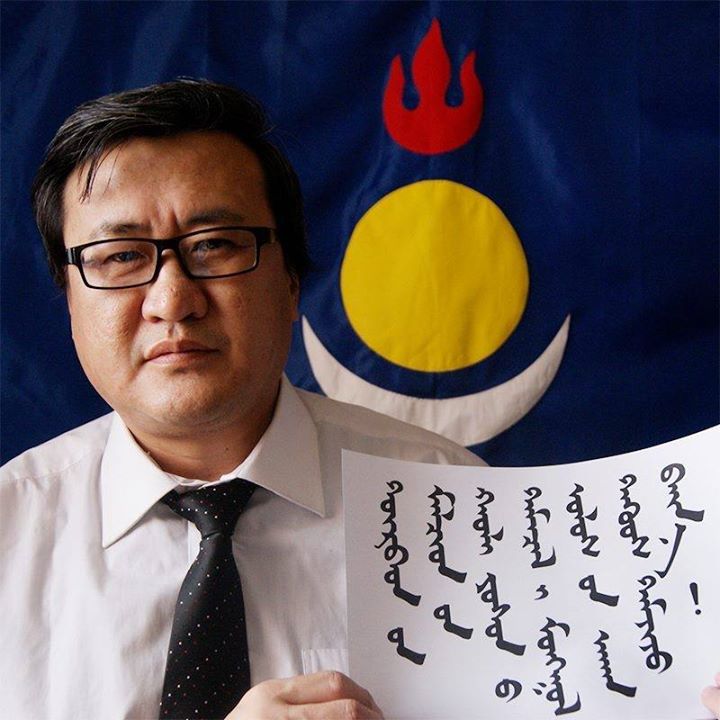 |
|
Mr.Munkhbayar
Chuluundorj with a
statement reading
"Brothers and sisters
from Mongolia are
supporting Durbed
herders' struggle for
legal rights." (SMHRIC)
|
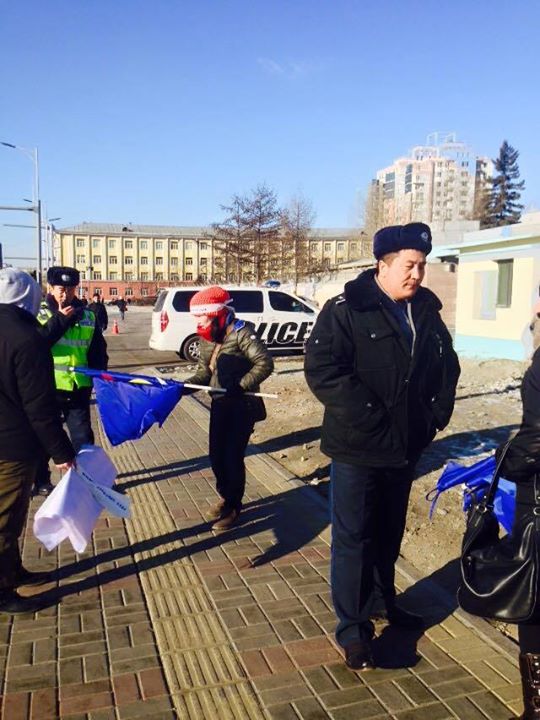 |
|
Mongolian police
arrested 8 citizens of
Mongolia for protesting
in front of the Chinese
Embassy in Ulaanbaatar (SMHRIC)
|
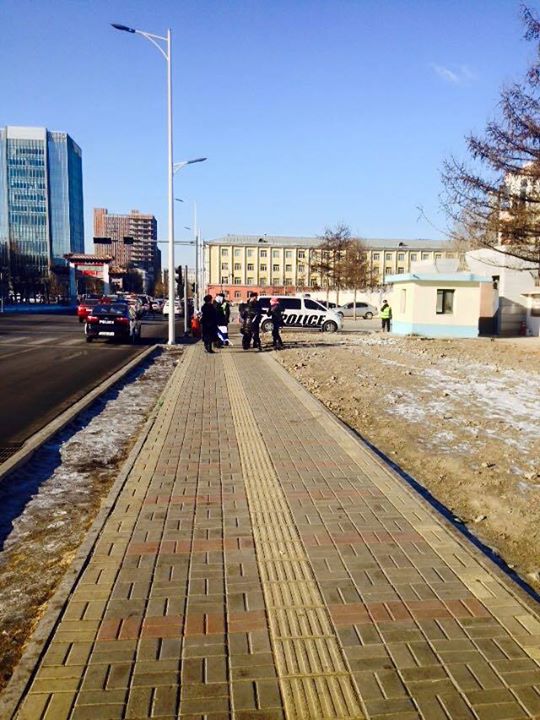 |
|
Mongolian police
carrying out the arrest
in front of the Chinese
Embassy (SMHRIC)
|





 Beyond
Great Walls: Environment, Identity, and Development on the Chinese
Grasslands of Inner Mongolia
Beyond
Great Walls: Environment, Identity, and Development on the Chinese
Grasslands of Inner Mongolia China's
Pastoral Region: Sheep and Wool, Minority Nationalities, Rangeland
Degradation and Sustainable Development
China's
Pastoral Region: Sheep and Wool, Minority Nationalities, Rangeland
Degradation and Sustainable Development The
Ordos Plateau of China: An Endangered Environment (Unu Studies on
Critical Environmental Regions)
The
Ordos Plateau of China: An Endangered Environment (Unu Studies on
Critical Environmental Regions)